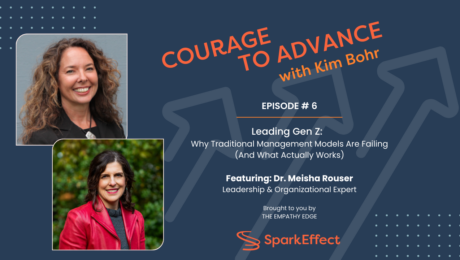In a recent episode of our Courage to Advance podcast, SparkEffect’s President and COO Kim Bohr sat down with Dr. Meisha Rouser, an organizational behavioral scientist with over 20 years of experience in leadership and change management. Their conversation revealed eye-opening insights about Gen Z in the workplace that challenge conventional thinking and offer a roadmap for more effective leadership.
Beyond "Kids These Days"
Let’s start with this thought-provoking question: What if Gen Z’s approach to work isn’t just different, but better?
This generation, roughly born between 1995 and 2012 (with those 29 and younger now in the workforce), brings perspectives shaped by unique formative experiences. They witnessed the 2008 financial crisis impact on their families and communities. Many entered the workforce during COVID, missing important professional socialization that previous generations took for granted.
Dr. Rouser noted how this generation was raised with certain expectations about following a prescribed path through education and into careers, only to find that reality didn’t match those promises.
Reframing "Entitlement" as Economic Reality
The Leadership Translation Challenge
A common misconception is that Gen Z displays entitlement, particularly around compensation. Dr. Rouser’s research reveals something more nuanced: they’re responding to genuine economic pressures.
“They do not want to have to rely on us,” Dr. Rouser explained about their relationship with parents. “Every single one I talked to, success to them was ‘I am doing this on my own.'”
Higher pay represents more than entitlement for a generation facing skyrocketing housing costs and significant student debt. It’s essential for their survival and independence. Kim Bohr reinforces this perspective, noting: “We shouldn’t be thinking of this as entitlement. This is them trying to look out for themselves—it’s about survival, basic needs, and not having to rely on their families beyond a reasonable time.”
For executives and managers, effectively leading Gen Z requires rethinking several key areas:
1. Clear Expectations and Boundaries
Gen Z thrives with structure. Dr. Rouser explained that this generation has grown up with checklists and clear expectations throughout their education. Leaders should provide explicit expectations—from performance metrics to promotion paths—while also creating freedom within well-defined boundaries.
2. Feedback That Resonates
This generation wants feedback, but traditional approaches often miss the mark. Generic praise feels hollow, while public recognition can sometimes backfire. Dr. Rouser recommends asking about past positive feedback experiences to understand individual preferences rather than applying one-size-fits-all recognition approaches. This personalized approach is illustrated by Dr. Rouser’s example: “Some Gen Z employees were mortified when praised publicly in front of the team. Instead of just asking how they want feedback, I’ve found it more effective to ask, ‘When you’ve received feedback in the past that felt valuable, why did you feel that way?'”
3. The Why Behind the What
One of Gen Z’s most valuable contributions is their willingness to question established practices. “They love to ask why,” Dr. Rouser observed. “And again, I love that because it’s like, why? Just because my manager’s working 80 hours a week, totally neglecting his family, why do I have to do that to be promoted?”
These questions are pushing organizations toward healthier, more sustainable work models. They challenge leaders to articulate purpose and meaning, not just process. Kim Bohr emphasizes the significance of this shift: “That is a very different trait from generations prior where many of us were taught you don’t question authority. It’s challenging when you have somebody who keeps asking why, but it needs to make sense for them—and that directly ties into their loyalty and engagement.”
4. Human Connection in Digital Environments
Despite growing up digital, Gen Z craves meaningful workplace connections. In her research, Dr. Rouser found that while Gen Z is comfortable with digital communication, they still value in-person interactions for important conversations and relationship building. It’s important for leaders to create intentional opportunities for these connections, especially in hybrid environments.
Developing Gen Z-Ready Leadership Capacity
The most effective leaders working with Gen Z demonstrate several vital capabilities:
- Behavioral & Personality understanding: Using tools like DISC, Myers-Briggs, or The Harrison to understand communication and learning preferences
- Adaptable feedback approaches: Tailoring feedback to individual preferences and learning styles
- Curiosity over judgment: Meeting questions with openness rather than defensiveness
- Balanced collaboration: Providing both team-based and individual contribution opportunities
Coaching Leaders for Generational Effectiveness
At SparkEffect, our executive coaching programs directly address these challenges by helping leaders develop the adaptability and emotional intelligence needed to thrive in multi-generational environments.
Our leadership coaches work one-on-one with executives to:
- Develop personalized feedback and development frameworks that resonate with Gen Z talent
- Build authentic connection strategies that bridge generational differences
- Create clear career progression models that balance flexibility with structure
- Transform resistance to generational differences into strategic advantage
Organizations investing in coaching report not only improved Gen Z retention but also enhanced leadership effectiveness across all generations.
Career Development That Works
SparkEffect’s career development programs complement this leadership approach by providing structured frameworks that satisfy Gen Z’s desire for growth while meeting organizational needs.
Rather than focusing on perks, our programs emphasize meaningful development through:
- Structured mentorship programs that facilitate cross-generational knowledge transfer
- Clear skill development pathways with measurable milestones
- Project-based learning opportunities that demonstrate real-world impact
- Transparent advancement criteria that align with both organizational and individual goals
Embracing the Future Together
As Dr. Rouser emphasized, “I am so excited about what this generation is going to bring, what they’re going to be changing. They’re just so creative, they’re so imaginative, they’re so collaborative in so many ways.”
The organizations that will thrive in the coming decades won’t be those that resist Gen Z’s workplace evolution but those that embrace it as an opportunity for transformation. With the right leadership coaching and career development approaches, this generational shift can become your competitive advantage.

To learn how SparkEffect can help your organization transform its approach to leading and developing Gen-Z talent, contact us today.






